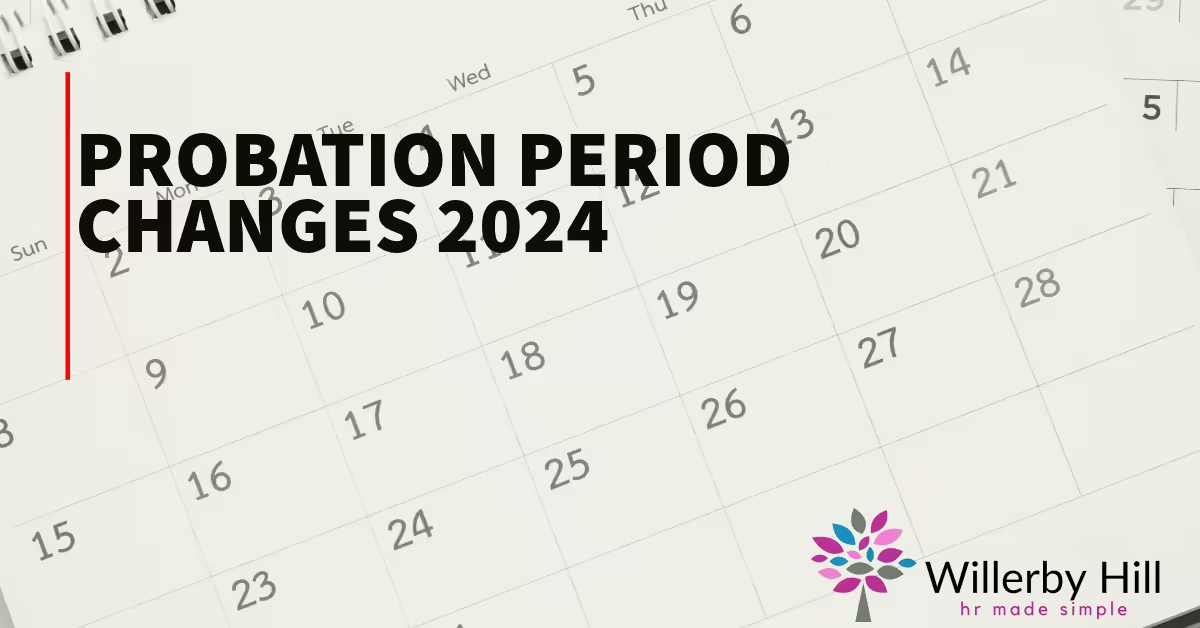Probation periods have been a major part of discussions regarding Human Resources this year. Since the Labour government led by Keir Starmer came into power in July 2024, it has been reiterated that the current employment laws in place in the UK are inadequate for modern society.
As part of the changes announced as part of the Employment Rights Bill 2024, the government plans to change worker’s rights. This includes increasing the number of rights a worker will have from the official commencement of their employment. This means that probation periods are going to be vital as these benefits will begin as soon as an employee’s probation period ends.
How do Probation Periods Work?
A probation period is a useful way for both employers and employees to ensure that a role is a good fit before either party commits long-term. It is in essence a trial period which is an essential process in all professions. For employers, they will often use this period to see if an employee is a good fit for a role.
Do All Employees Require a Probation Period?
Probation periods tend to only be used for new starters. In a small number of occasions, an employer may decide to offer someone on a trial basis to see how it goes and if the employee can adapt to their new role.
In these instances, especially if the employee has more than 2 years’ service, then a probation period would have no effect as any dismissal would have to meet the Company’s disciplinary process and dismissal would likely be on the grounds of capability.
Where a trial is offered, it is normally on the basis of the employee being able to return to their old role on their previous terms and conditions.
Should any Probation Period be Mentioned in an Employee’s Contract?
If a new employee is to be subject to a probation period this must be stated in their contract and it should specify how long the period is for, whether or not it can be extended and what happens when they pass it. It is essential this is all in writing.
Whilst more of a technical matter, not stating a new job is subject to a probation period and then dismissing the employee because they have not passed probation could lead to claims of breach of contract by an employee.
How Long Should a Probation Period Last?
There is no set length of time for a probation period however, the vast majority of roles include a period of around three to six months. Longer probation periods are usually required for roles which are highly technical as employers will need more time to effectively assess the individual’s suitability for a role.
Employers have the option to extend a probation period if it is decided that the employer needs more time to determine if the employee will meet the requirements of the role. It must be noted that the ability to extend the probation period of an employee, alongside the initial length of the probation period, should be in all employee contracts.
What Should Happen at the End of a Probation Period?
Before the end of an employee’s probation period, a probation review meeting should be conducted in order to assess their employment and determine the necessary next steps.
These meetings should be conducted prior to the end of this period in order for any necessary performance issues to be raised and be rectified before the conclusion of their probation.
It is important that you keep a written summary of everything discussed within the meeting in case the requirements outlined in the evaluation are not met and further action must be taken.

Photo by charlesdeluvio on Unsplash
How are Probation Periods Changing?
At present probation periods have no real legal status and so are more of a contractual agreement than a legal one.
Under proposed legislation the status of a probation period and how an employee may be treated and dismissed during or at the end of the probation period is going to become more formalised and will have some statutory meaning from Autumn 2026.
Previously, if an employee passed their probation and subsequently issues arose, they would not be able to claim unfair dismissal if they had been with the organisation for less than two years. However, the Government’s planned changes will ensure that unfair dismissal is a day one right, meaning that probation periods will be more important than ever.
There is no clear guidance in terms of if this change to employment rights will include an increase in the maximum length of probation periods however, it is understood that the government is planning to create a limit of nine months maximum probation period for any role and introduce measures that determine what will amount to a fair dismissal during or at the end of the probation period.
The measure of what is likely to be seen as fair is yet to be determined, but it would seem it is likely to include the following aspects:
- There must be some sort of evidence to justify why an employee has failed probation – this may be based on probation reviews conducted during the probation period, absence data, productivity records etc,.
- The employee must be invited to attend a meeting to discuss the intention of failing probation and may include the right to be accompanied.
- The employee may be given the right to appeal a decision within set timeframes.
This means the gathering of evidence to justify a reason for termination is likely to become more important than was previously required.
How should Employers Respond to these Changes?
As a result of these changes, employers may have to take a more direct approach towards probation periods, ensuring that…
- Their recruitment process is more refined, requiring more of an extensive interview process to ensure roles are filled by suitable candidates rather than those who are available at the time. However, any changes to the hiring process must follow discrimination laws.
- All targets/goals/objectives/criteria required for passing their probation period are clearly outlined prior to commencement
- The timeframes for meeting this criteria are also clear to the employee
- They consider conducting probation meetings earlier than normal in order to thoroughly assess an employee’s progress with multiple meetings necessary in certain cases where dismissal may be contentious or there is a likelihood of a appeal being made
- They consider including the right to extend any probation period in new employee contracts
- Every stage of the probation process is be documented in case evidence is required
While these changes are not currently slated to be implemented until Autumn 2026 at the earliest, businesses should start to consider any necessary adjustment to how probation periods are conducted for their employees.
Willerby Hill will continue to provide updates across our site regarding any updates from the government in terms of future employment law changes. In the meantime, if you require any further information or guidance regarding probation periods or any other HR issues, please get in contact with us.

